 W
WAn appetizing store, typically in reference to Jewish cuisine in New York City, particularly Ashkenazi Jewish cuisine, is a store that sells "food that generally goes with bagels", although appetizings can also be served with a variety of breads. Appetizings include smoked and pickled fish and fish spreads, pickled vegetables, cream cheese spreads and other cheeses.
 W
WA bake sale is a fundraising activity where baked goods such as doughnuts, cupcakes and cookies, sometimes along with ethnic foods, are sold. Bake sales are usually held by small, non-profit organizations, such as clubs, school groups and charitable organizations. Bake sales are often set up around an area of pedestrian traffic, such as outside a grocery store or at a busy intersection near a mall. Bake sales are also a popular fund raising activities within corporations.
 W
WBulk foods are food items offered in large quantities, which can be purchased in large, bulk lots or transferred from a bulk container into a smaller container for purchase. Bulk foods may be priced less compared to packaged foods because they are typically packaged in large generic bulk containers and packaging for grocery outlets, which utilizes lesser natural resources. Additionally, less packaging is congruent with the environmental conservation of natural resources and sustainability. One study found a 96% reduction in packaging used for bulk foods compared to packaged foods.
 W
WA cakery or cake shop is a retail business specializing in producing and/or selling cakes; they may also sell cupcakes, muffins, sponges, as well as other baked goods that fall under the title of a cake. Cake shops may also sell equipment and supplies for home cake baking, especially for cake decorating, but not all do this. Another common but not universal sideline is special orders such as wedding cakes and elaborate birthday cakes.
 W
WColonial goods stores are retailers of foods and other consumer goods imported from European colonies, called colonial goods. During the nineteenth century, they formed a distinct category of retailer in much of Europe, specializing in coffee, tea, spices, rice, sugar, cocoa and chocolate, and tobacco.
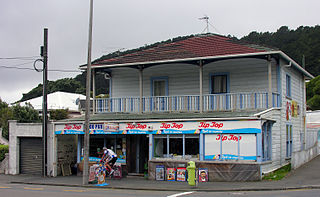 W
WA dairy is a small owner-operated convenience store in New Zealand, licensed to sell groceries, milk, eggs, dairy products, perishables, newspapers and other staples during and after normal trading hours.
 W
WTraditionally, a delicatessen or "deli" is a retail establishment that sells a selection of fine, exotic, or foreign prepared foods. Delicatessen originated in Germany during the 18th century and spread to the United States in the mid-19th century. European immigrants to the United States, especially Ashkenazi Jews, popularized the delicatessen in American culture beginning in the late 19th century. More recently, many larger retail stores like supermarkets have "deli" sections.
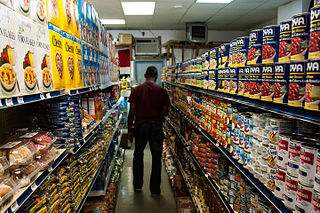 W
WA food desert is an area that has limited access to affordable and nutritious food, in contrast with an area with higher access to supermarkets or vegetable shops with fresh foods, which is called a food oasis. The designation considers the type and quality of food available to the population, in addition to the accessibility of the food through the size and proximity of the food stores.
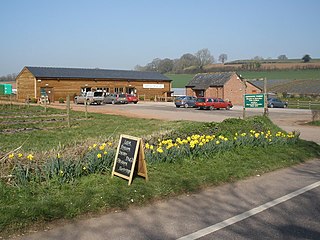 W
WA farm shop, or "farm stand" in the United States, is a type of retail outlet which usually sells produce directly from a farm. Some farm shops also resell related goods such as locally produced groceries, foods, drinks and delicatessen products.
 W
WFood models, also known as fake foods or food samples are a model or replica of a food item made from plastic, wax, resin or similar material. These models are commonly used in restaurant street displays in Japan and Korea to represent the dishes available inside.
 W
WA fruit stand is a primarily open-air business venue that sells seasonal fruit and many fruit products from local growers. It might also sell vegetables and various processed items derived from fruit. The fruit stand is a small business structure that is primarily run as an independent sole proprietorship, with very few franchises or branches of larger fruit stand conglomerates, though many large food industry businesses have developed from fruit stand businesses.
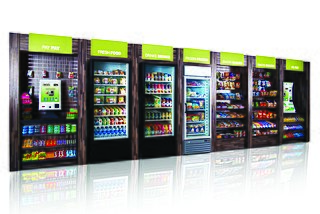 W
WMicro Markets are a retail sector, closely tied to the vending machine industry, that utilizes automated self-checkout technology to operate in locations that require unattended payment capability. Grab-and-go Micro Markets are unattended retail environments where consumers can purchase products from open shelves, coolers, or freezers. Consumers use a self-checkout kiosk to purchase their products, or advanced AI technology that is leveraged to facilitate a seamless experience, as with Amazon Go. They are a hybrid form of vending, foodservice, coffee service, and convenience stores that provide an improved customer experience, exponentially greater product variety, and increased sales within a single location, while keeping labor costs down and increasing operational efficiencies. Given the market sector in which Micro Markets exist, the National Automatic Merchandising Association (NAMA) “recognize[s] [Micro Markets] as one of its focus channels along with vending, foodservice and refreshment services". The COVID-19 pandemic is expected to drive innovation in the self-checkout model as vendors are looking for ways to provide safe, touchless, and easy-to-use self-checkout solutions to protect both employees and customers.
 W
WIn Australia and New Zealand, a milk bar is a suburban local general store. Similar terms include tuck shops, and delicatessens or "delis". Milk bars are traditionally a place where people pick up newspapers, and fast-food items like fish and chips and hamburgers, and where people can purchase milkshakes and snacks. They are essentially a smaller scale suburban form of the convenience store but are more likely to be "Mum and Dad" small business and not larger franchised operations.
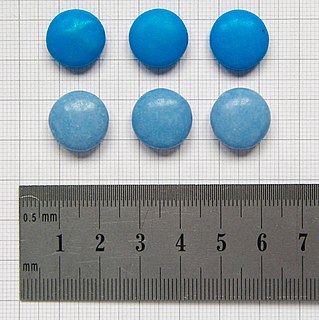 W
WNatural food and all-natural food are terms in food labeling and marketing with several definitions, often implying foods that are not manufactured by processing. In some countries like the United Kingdom, the term "natural" is defined and regulated; in others, such as the United States, the term natural is not enforced for food labels, although there is USDA regulation of organic labeling.
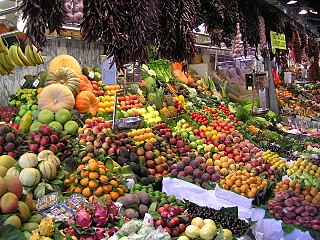 W
WProduce is a generalized term for many farm-produced crops, including fruits and vegetables. More specifically, the term produce often implies that the products are fresh and generally in the same state as where and when they were harvested.
 W
WShelf life is the length of time that a commodity may be stored without becoming unfit for use, consumption, or sale. In other words, it might refer to whether a commodity should no longer be on a pantry shelf, or just no longer on a supermarket shelf. It applies to cosmetics, foods and beverages, medical devices, medicines, explosives, pharmaceutical drugs, chemicals, tyres, batteries, and many other perishable items. In some regions, an advisory best before, mandatory use by or freshness date is required on packaged perishable foods. The concept of expiration date is related but legally distinct in some jurisdictions.
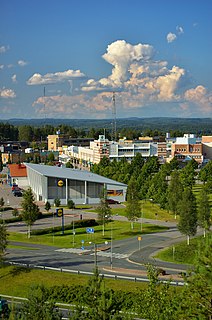 W
WA supermarket is a self-service shop offering a wide variety of food, beverages and household products, organized into sections. This kind of store is larger and has a wider selection than earlier grocery stores, but is smaller and more limited in the range of merchandise than a hypermarket or big-box market. In everyday U.S. usage, however, "grocery store" is synonymous with supermarket, and is not used to refer to other types of stores that sell groceries.
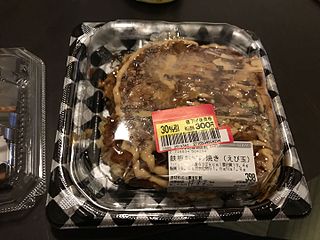 W
WYellow stickers are a method of alerting shoppers to food which has been reduced in price because it is approaching its sell by date.